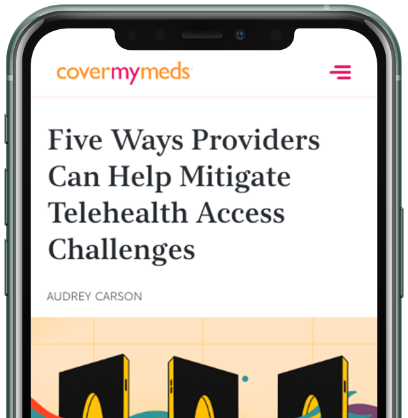'Ask Your Doctor If:’ How to Talk to Patients About Popular Drug Ads
Patients often see ads for medications on TV and in print encouraging them to talk to their doctor. Now, in the digital age, with more targeted ads than ever, patients are asking providers about medications specific to their condition. This article provides guidance on how providers can hold productive patient conversations when these questions come up.

“Talk to your doctor about starting (insert medication name here).”
Since 1997, when the U.S. Food and Drug Administration eased its regulations on prescription drug advertising, consumers have seen ads daily for various medications, from those that relieve seasonal allergies to tumor- and stage-specific oncology therapies.Public Policy Issues in Direct-to-Consumer Advertising of Prescription Drugs, Calfee, 2002
Now, in the digital age of social media and search engine marketing, people see targeted medication advertisements based on recent search history and even health app data.
Most of these ads have a similar call to action, asking viewers to talk to their provider about the medication. Biopharma spend on advertising in the consumer market eclipses business-to-business advertising spend — 3.2 billion compared to 693 million respectively so far in 2021. Therefore, it’s likely patients are coming to appointments with these questions more often — even before a provider may be familiar with a particular medication.4 Top Pharma Advertising Trends of 2021, Media Radar, 2021
Providers, especially specialists, often have established treatment plans, guidelines and preferred treatments based on evidence. More importantly, they know their patients and how each is impacted by their diagnosis, which plays a key role in personalized medicine.
In addition, Marcus Neubauer, MD, chief medical officer for The U.S. Oncology Network, points out, treatment plans including patient values and preferences “should be shared,” as they are an important part of making treatment decisions.
Below are tips to help providers have productive conversations with patients who come in with questions about medications they’ve seen advertised. These tips will help foster collaborative, informed decisions.
Maintain patient trust through decision transparency
In a recent survey, 84 percent of patients said they trust their individual doctors — more than hospitals (72 percent) and the U.S. healthcare system (64 percent).Surveys of Trust in the U.S. Health Care System, NORC at the University of Chicago, 2021 This speaks to the powerful impact individual providers can have on decision-making and patient outcomes.
When patients come to their provider with questions about medications or their diagnosis it presents an opportunity for continued patient education.
Providers and their care teams can dive deeper into a patient’s diagnosis, comorbidities, disease progression, and medication side-effects.
This is a good time for providers in turn to gather additional information about a patient’s preferences or social situation that could influence future healthcare and medication decisions.
Further, holistic discussions could help improve patient health literacy, which can have a positive impact on medication adherence.
Today, because specialty medications are very expensive, the conversations between patient and provider often starts with efficacy and side effects and often includes cost and affordability.Effects of health literacy on patients' adherence to prescribed medications: Narrative systematic review and meta-analysis, Zhang, 2013
“Today doctors need to have some awareness of what drugs cost and be prepared to give some guidance,” Neubauer said.
Understanding drug costs could help the 79 percent of patients who found out in the last 12 months their prescription cost more than expected.CoverMyMeds Patient Survey, 2021 This sticker shock can lead to delays in treatment and even some patients outright abandoning their medication.
While 91 percent of providers are discussing medication affordability with their patients, only 45 percent can surface patient-specific benefit information within their EHR and just 26 percent have plan-specific cost information.CoverMyMeds Provider Survey, 2021 Improvements in transparency and data access could round out holistic conversations with patients regarding medication decisions and support.
Provide trusted sources of education
When a patient comes to an appointment with questions about a medication they’ve seen advertised, they’re taking a vested interest in their health and treatment options.
This can be a time to offer materials, print or digital, from trusted sources created specifically for patient education through digital connections within provider and care team workflows. Platforms like patient portals can provide access where patients electronically receive materials to read and reference them at their convenience.
Neubauer stressed the importance of holding a conversation with patients when prescribing and explaining medication choices.
“Giving patients a treatment plan, which includes the rationale for drug choices, potential side effects and expected outcomes is part of the conversation between the patient and doctor that you’re not going to get out of a TV commercial,” Neubauer said.
Virtual and in-person support groups, specific to the patient’s diagnosis, disease state and even genetic markers, can also provide information for those looking for additional support.
In a recent study, 51 percent of patients said they consulted a community support group during treatment in 2020, up from 46 percent in 2015.Move the Needle, Amplifying the signal for patient services, Accenture, 2021
“We’re always striving for better ways to educate,” Neubauer said. “There’s a lot of activity around social media with younger, tech-savvy patients. Providers getting more facile with technology will be important to better communicate the important aspects of a recommended treatment.”
We’re always striving for better ways to educate. There’s a lot of activity around social media with younger, tech-savvy patients. Providers getting more facile with technology will be important to better communicate the important aspects of a recommended treatment.
Marcus Neubauer, MDU.S. Oncology Chief Medical Officer
It’s OK to say, 'I don’t know'
Neubauer noted that, while not often, it’s possible for a patient to come in and ask about a medication a provider hasn’t heard of. Especially in oncology, where there are often multiple drugs in a similar space and memorizing all of them isn’t needed to deliver quality patient care.
Patients may also come across off-label treatments in support groups, internet searches or on social media. In fact, it is not uncommon for a patient to bring in vast internet search results for the physician to review.
What’s a proper response?
“I will say something like, ‘This will take some time to review so give me a chance to review after our visit today,’” Neubauer said. “Then I can give a more informed reply.”
The problem with internet searches on cancer issues is that the information is vast and unfiltered and in order for the physician to review and provide context, this can take a lot of time.
Because of the anxiety that can come with finding treatment for a complex and/or serious diagnosis, Neubauer stressed the importance of giving patients a timeline of when to expect an answer.
Don’t dismiss a reasonable request
“Dr. Google Will See You Now.”
So reads one headline about the popular search engine’s influence on patients and their pursuit of medical information.
In fact, Google says about 7 percent of all internet searches are health related — a percentage that amounts to about 1 billion health-related questions a day.
Patients are more often seeking health information online, with 57 percent of patients saying they used an online search and 54 percent a medical website to find information after treatment in the last year.Move the Needle, Amplifying the signal for patient services, Accenture, 2021
While a biopharma advertisement may initially pique a patient’s interest in a medication, many may do additional research to understand if the medication is right for them.
Neubauer noted that there’s not always a singular treatment answer for each patient.
“It is very reasonable for patients to seek information and present this information to their doctors,” Neubauer said. “TV advertisements are one form of information but often don’t apply to a patient’s situation. This requires a conversation explaining why (or why not) a medication is right for them.”
By leaning in to shared decision making, providers can help patients navigate through questions. regarding medication appropriateness and access.
When patients bring forth questions about their treatment plan, whether from a drug advertisement, side effects, cost concerns or impact on their life, providers can take the opportunity to help patients better understand their conditions and treatments so they can feel more in control of their health.
Read more about prescribing specialty therapies in the 2021 Medication Access Report: Specialty Edition.
The latest healthcare insights, floated right to your inbox.





